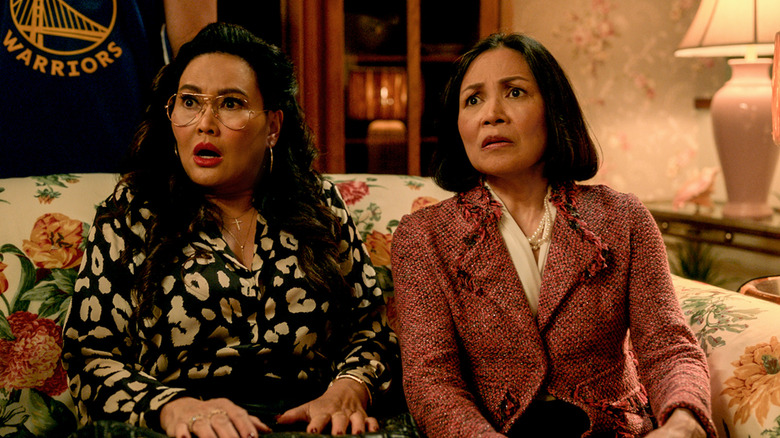
Even though "Easter Sunday" is the first mainstream Hollywood movie to prominently feature a Filipino family in a starring role, Filipinos have been around the entertainment industry in America for a long time. In addition to literally laying the foundation of Hollywood brick by brick alongside other immigrants, Filipino performers have been appearing in film, television, and theater for decades. People like Lea Salonga of "Aladdin" and "Mulan" fame and "Hook" star Dante Basco are among those Filipinos that have been grinding for years, but there are plenty more out there.
"Easter Sunday" features a number of Filipino American acting legends. Hailing from the stage, Lydia Gaston plays Joe Valencia's mother, Susan, in the film. Meanwhile, Joe's aunt Teresa is played by Tia Carrere, who is best known for her roles in the long-running soap opera "General Hospital," Disney's "Lilo and Stich" franchise, and the "Wayne's World" films. While promoting the new movie from popular comedian Jo Koy, we had the pleasure of speaking to Carrere and Gaston about the film, the feeling of being able to play Filipino characters onscreen, and the parts of their culture that they were excited to share with a wider audience. Plus, Carrere touches on her fan favorite roles from "Wayne's World" and "Lilo and Stitch," which have both endured the test of time and have each celebrated milestone anniversaries recently.
'I Think It'll Really Change The Game'
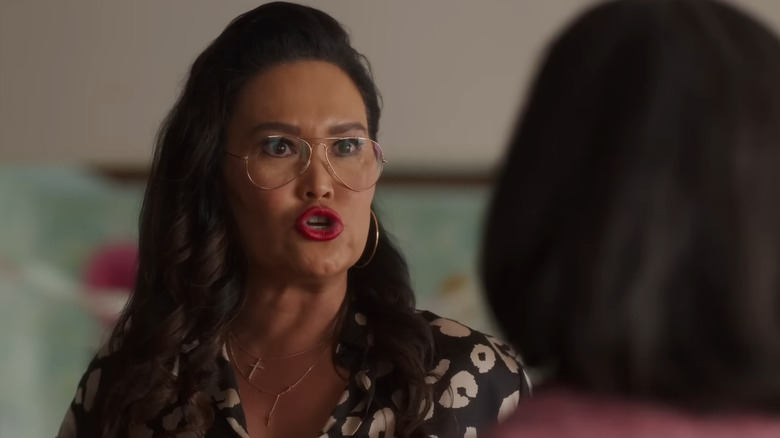
Despite being documented in North America as early as 1587 and being one of the highest group of Asians represented in America today, why do you think it's taken so long for a Filipino family to be spotlighted in a movie from a major Hollywood studio?
Carrere: Because we were waiting for Jo Koy and Steven Spielberg to get the story out there! No, but I don't know why. [Maybe] because we're so polite and hard workers and we don't raise our heads.
Gaston: Because we've always been bilingual? I don't know.
Carrere: Yeah. We can blend in.
Gaston: [Because we can] blend into the culture wherever we are, I guess, maybe.
That's true.
Carrere: We keep our head down and work hard.
While doing research for an article about the first Filipino movie star in Hollywood recently, I learned that your co-star, Lou Diamond Phillips, has only played a Filipino onscreen three times, including "Easter Sunday." Have you had a similar experience?
Carrere: In 40 years, I never have until now.
Really?
Carrere: Yeah. It's crazy to think all the different Asian backgrounds that I've portrayed, but in 38 years, this is the first time I played Filipino. I tried to do it. I auditioned for "Modern Family" and I tried to make [Gloria] Filipino, but I mean, Sofia Vergara. Come on. I understand.
So how much did it mean to you when you finally got to play a Filipino character for the first time?
Carrere: Oh, this is a treat. It's fun. It's like a great big hug from all my Filipino neighbors, my family, my ancestors before me. It's such a celebration of everything, culturally, that's inside of my DNA. It's been a blast and I'm so honored to be able to be in this film, finally, after all these years.
Gaston: I played a lot of Filipino characters, mostly on stage. That's always been fun, but doing it on film is very different because the exposure is much wider. I know that many of my Fil-Am actor friends are very excited for this film to be seen. I think it'll really change the game.
'We Got Along Like, As They Say, A House On Fire'
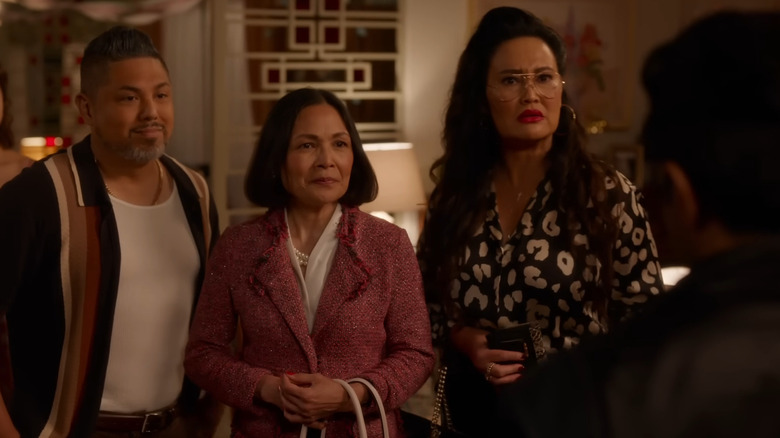
Your characters, Tita Susan and Tita Teresa, spend a good portion of the movie at each other's throats. Would you say that their onscreen rivalry is reflective of your real life relationship?
Carrere: Oh goodness, no! We wouldn't be sitting here next to each other sharing the phone if that was the case.
Gaston: No, we got along like, as they say, a house on fire. We loved hanging out. We hung out in our time off. I don't think you'd have seen that chemistry [onscreen] if we really didn't get along in real life.
Based on my own family and other Filipino families I know, their over-blown dramatic feud is something that could occur in every Filipino family. Have you both experienced an unnecessary rivalry like this one in your families?
Gaston: Yeah, I think so. But most of the time, the rivalry would have been just not talking to each other. You don't even know why they're not talking to each other, but it's very apparent that there is a tiff, that there's a feud. Usually my parents would say, "You can talk to their children because it's not your fight. It's just between the two of them."
'It's Colored By His Experiences As A Child'
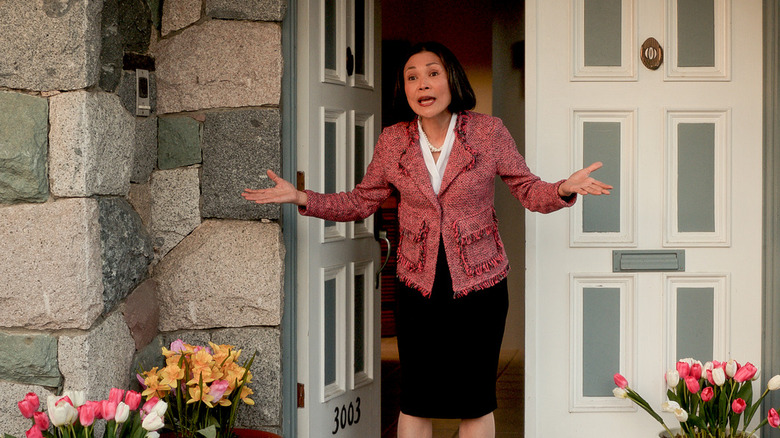
So Lydia, your character is based on Jo Koy's mom, Josie. Did you consult her at all during your preparation for "Easter Sunday?"
Gaston: No, I did not. I was sent videos of her, which I watched, and pictures of her in her best clothes. That was the wardrobe department that sent me that, and that helped my characterization of her. I also watched a lot of Jo Koy doing [impressions of] his mom, because I think it was really interesting. It's very interesting to watch him do his mom because it's colored by his experiences as a child. As an actor, that really helped me with my approach and the way I would attack him to get that result.
How about you, Tia? What were some inspirations for Teresa?
Carrere: Well, I think she's more of a composite of spicier women that I knew in my neighborhood growing up and my more extended family, because my immediate family's very reserved. My grandma's very reserved. More of that very quiet, stoic kind of woman. I spent a lot of my formative years with her. I had to dig further afield to find Teresa. She's a composite of a few different people.
'Sometimes It Was Hard To Tell When I Should Come Back With My Line'
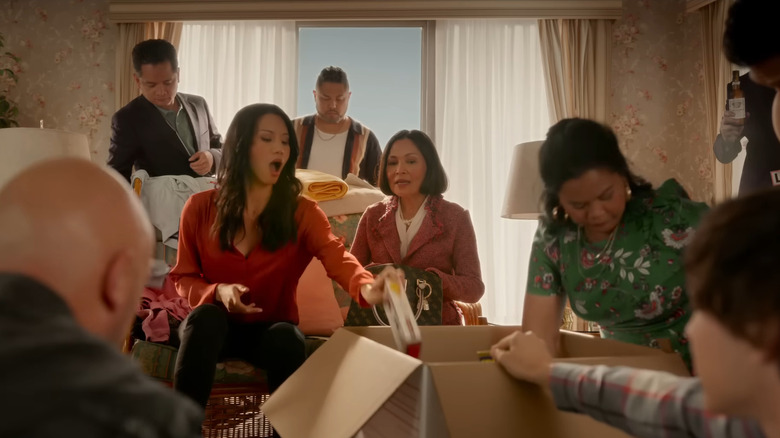
With so many extremely talented performers in your cast, especially those who have comedic backgrounds, there had to be a lot of opportunities for improvisation and riffing. Was that the experience that you both had on set?
Gaston: Oh, yeah. The comedians on set, they would just go on with their improv. Sometimes it was hard to tell when I should come back with my line. At one point, I was ready to say my line and Jo would say, "Wait, I'm not done yet." They're so quick [and] they're so smart that it just -- the reactions and their responses are just so clever and funny.
Carrere: Most of our stuff was already written, but we did throw some key phrases here and there and did a little improvising. But I mean, if they included all of our improvisation, the movie would be five hours long. I guess they had to cut someplace, but it was fun playing and calling upon our upbringing.
Were there any elements that were cut that you thought were really funny that you wish were still in the movie?
Gaston: Well, I liked when our argument that the picnic outside went on a few more lines. It went boom, boom, boom, BOOM. It was like one, two, three, BOOM. And they kind of cut it after a couple lines. You still got the point across, I thought.
I can't wait to see the gag reel.
Gaston: Oh, yeah. I know. We should have one. Tia and I should have a long gap there.
Carrere: Yeah, I know, there should. There should be a few more in there. You'll see it.
I was just picturing the balikbayan box scene where you guys are putting everything in the box. I imagine that there could have been more things added to the box.
Gaston: No, I think that's all. I mean, that was exactly what was written in there. We didn't add anything else. That would've been funny if they added more stuff, though. That's a good idea. See? We should have done that. There are outtakes of that [though], because we improvised a lot during the balikbayan [box scene]. Something about the voltage. Remember?
Carrere: Oh yeah, yeah, yeah.
Gaston: [Playing off the idea that] it's the wrong voltage.
Carrere: That's right. You're right. I would like to see. Where's our outtakes, doggonit? Go and talk to the director, Jay, right now!
'Food Is Theater'
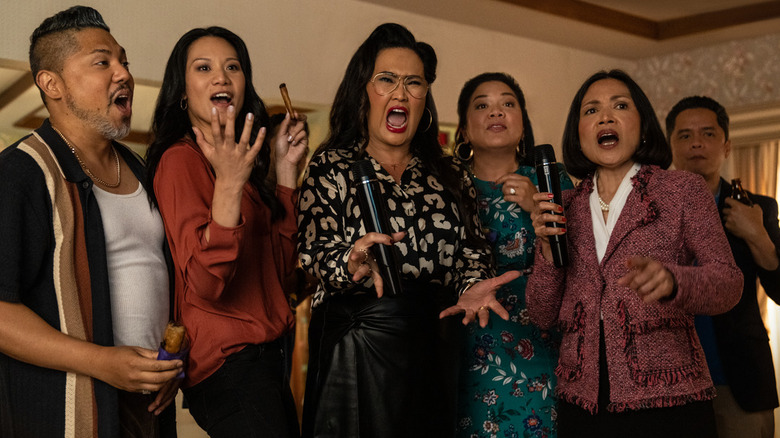
What were some of your favorite parts to showcase about the Filipino culture when putting together "Easter Sunday?"
Gaston: Well, of course the karaoke.
Oh, I loved it.
Gaston: The singing is amazing.
Carrere: When we get together we're always singing anyway, even in our time off.
Gaston: And we look great in our clothes. I made sure that I had red lipstick because I wanted to indicate things with my lips the way Jo has said in his comedy that his mom would point to things with her lips. So I wanted to incorporate that into my character for sure.
Carrere: Well, the food is art.
Gaston: Food, yeah!
Carrere: Food is theater. And the sense of humor that we have, it's all there. It's clever. What else about the culture? Oh! we're very ... like when we all have the same password? [Laughs]
Yes! It was Manny Pacquiao's birthday.
Carrere: We stick together! We stick together. So we're very loyal. We're very loyal.
'It's A Key Intrinsic Part Of The Story That I'm Telling'
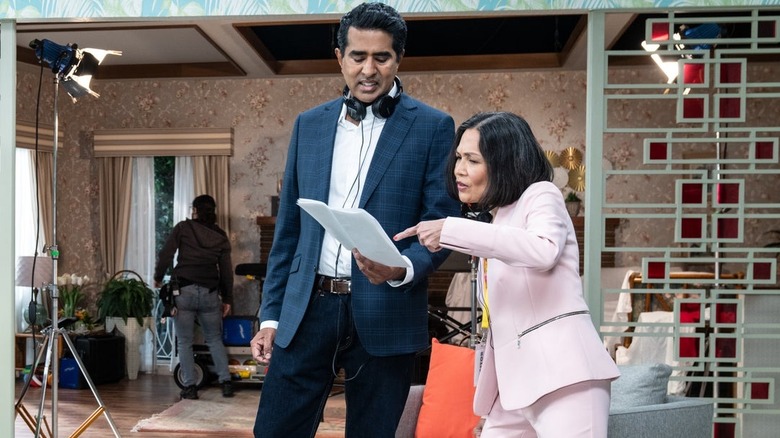
There was a part in the movie where director Jay Chandrasekhar's character, Nick the agent, wants Joe Valencia to just do an accent so he can land a job. Have you two experienced something similar like that in your careers?
Carrere: I've always done accents. Chinese, Japanese, Vietnamese, but they're always specific. It's a key intrinsic part of the story that I'm telling, so I didn't have a problem with it. I think his problem in the film was that it was just like a lawyer or a whatever and they wanted him to have an accent because it was funny, which is a very different thing. I think it's a case by case basis in all the different films that I was in, from "Rising Sun" to the little girl who speaks Cantonese but rocks like nobody's business in "Wayne's World." It was all very specific to a character and a place and an ethnicity, but the accent was not the butt of the joke. So stand behind it.
Gaston: I would say that I've done a lot of Filipino plays. I've used my Filipino accent, but in the more recent plays, the playwrights don't really require an accent because they're writing about regular Filipino Americans.
'It's A Gift. I Pinch Myself'
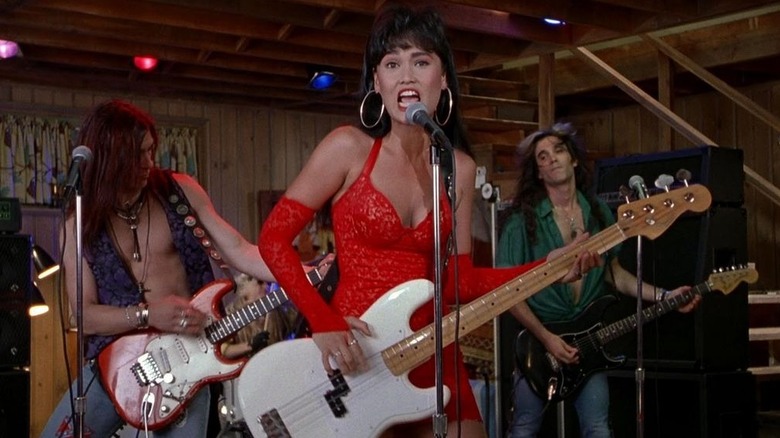
"Easter Sunday" is kind of a throwback in the sense that studios used to take comedians and build comedies around them a lot more. Tia, as you know, Mike Myers had a great career in all those movies that he did. So do you think this movie is kind of a return to that model?
Carrere: Wow. I don't know. I mean, this is a family comedy, first and foremost. It's not like you put on a funny face and the accent and funny teeth or anything. It's very grounded in reality. And I think it's very heartfelt, so it's kind of different from those other films that you're mentioning, but still funny as funny can be.
Earlier you mentioned "Wayne's World," which just celebrated its 30th anniversary. How does it feel to have your work still remembered so fondly after all these years?
Carrere: Oh, it's incredible feeling so old. [Laughs] No, I'm just kidding. I'm kidding. I am so amazed when I hear [or] somebody reminds me. It's the 30th anniversary of "Wayne's World." It's the 20th anniversary of "Lilo and Stitch." I'm just thinking, "Thank God the creek didn't rise and I'm still standing here in front of you doing movies, doing what I love best." It's a gift. I pinch myself. I can't believe how lucky I am.
Speaking of "Lilo and Stitch," they're working on a live-action version right now. Do you hope that you'll get a call?
Carrere: Yeah! Dan Lin's producing it. The same company that produced ["Easter Sunday"]. Rideback Ranch. So I already put in my pitch. I think I need to be in this movie. I'll go get my muumuu. I can be singing a Hawaiian song in one of the scenes. I already put it out there.
'I Love All The Filipino Food'
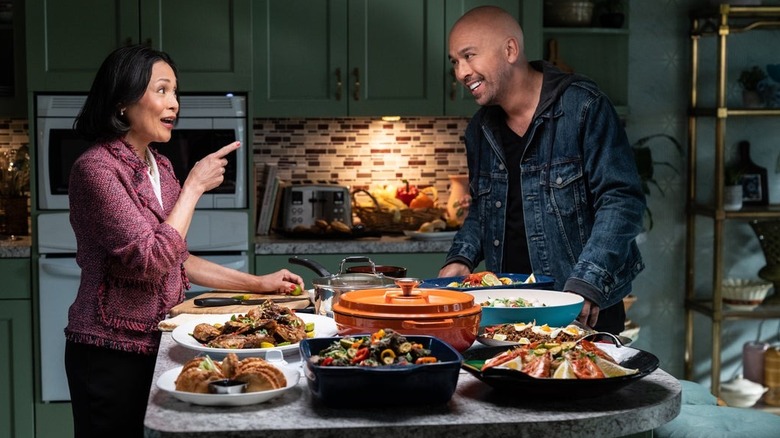
Finally, as we did touch on earlier, food and meals are very much at the center of Filipino culture. It's also somewhat the backdrop of Tita Susan and Tita Teresa's rivalry. What are some of your favorite Filipino dishes to make or to eat?
Carrere: I don't make pancit palabok, but someone just came in here and gave us some. It's really good. I make chicken adobo because it's easy. You can stretch it for several meals because of the sauce. But it's really easy to make, that's why I make it. Otherwise, I go to a Filipino restaurant because it's better that way.
Gaston: I love all the Filipino food. Some of my favorite memories are the prep line for making the lumpia. We'd all stand in a line. One would separate the sheets, the rice sheet, because it was so hard to separate the wrappers. And then somebody else would put the ground pork and then the shrimp and then the carrots and celery and beans sprouts. So it was a whole conveyor belt getting these lumpia ready. And so the anticipation builds up as you're making it and sealing it and frying it. It was the most delicious thing you ever put in your mouth once you've had it. Lumpia's pretty awesome.
But I [also] love budbud, we'd call it. Nobody knows what budbud is. But it's coconut milk that you make yourself and the brown sugar caramelized together. Then [add] the sweet mochi rice and it becomes a sticky, sweet suman. And I can make it, which is awesome.
Carrere: I don't make that.
Gaston: Well, because you're healthier than me.
"Easter Sunday" is currently playing in theaters.
Read this next: Adam Sandler's 14 Best Roles Ranked
The post Easter Sunday Stars Tia Carrere and Lydia Gaston on Improv, Filipino Food, and More [Interview] appeared first on /Film.
